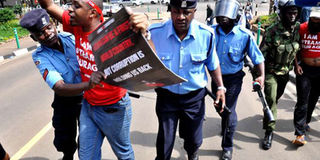Why we can’t afford to have a weakened civil society

Police officers arrest a civil rights activist Boniface Mwangi during a demonstration along Nairobi streets on December 1, 2015. PHOTO | GERALD ANDERSON | NATION MEDIA GROUP
What you need to know:
- In a country whose leadership is infested with greedy political elites and ethnic bigots, it is safe to imagine that the true custodians of public interest are the human rights defenders.
- There are many key victories delivered by the pro-democracy/human rights groups in the recent battle to liberate Kenya from dictatorship.
I tend to look at myself as a card-carrying supporter of Kenya’s civil society.
In a country whose leadership is infested with greedy political elites and ethnic bigots, it is safe to imagine that the true custodians of public interest are the human rights defenders, pro-democracy campaigners and development charities.
But the recent oil-induced interest shown by the State in the historically marginalised north, for instance, local communities still have a reason to view the NGOs and faith-based charities that run programmes there as the real government.
And there are many key victories delivered by the pro-democracy/human rights groups in the recent battle to liberate Kenya from dictatorship and nurture a culture of good governance from the top of my fingers.
The list includes the repeal of the infamous Section 2A that paved the way for the reintroduction of multiparty democracy; the minimum electoral reforms that sought to level the playing field in the 1997 elections; the united opposition front that ended Kanu’s reign in 2002; the promulgation of the new Constitution in 2010; and the ICC prosecutions and indictments that averted a repeat of the 2007-type bloodletting in the 2013 elections.
Of course the list would be much longer if I were to cite the individual battles waged by civil society personalities against corruption and fraudulent leadership such as David Ndii’s recent exposure of the Eurobond scandal and John Githongo’s whistleblowing on Anglo Leasing.
HOSTILE ENVIRONMENT
Dr Ndii sticking out his neck on Eurobond was particularly interesting considering the hostile environment civil society has had to operate in under President Uhuru Kenyatta’s regime.
With the democratic space increasingly squeezed, the public mobilisation capabilities that saw the campaigners of the 1990s get sizeable crowds of protesters to the streets on short notice have been neutralised.
What worries me more is the dearth of strategic thinking in the mainstream civil society that has made it underestimate the establishment, leave itself open to infiltration, let its agenda hijacked or get so easily outfoxed so often.
The occasional demo heavily reliant on the heroics of one Boniface Mwangi are unlikely to bother the State much.
Take the recruitment of the Chief Justice and Supreme Court judges, for example. In 2011, helped by the groundswell of public demand for a reformed Judiciary, civil society was able to have one of their own, Willy Mutunga, become Chief Justice.
But the new CJ would soon be captured by a cartel of State agents.
What do you call a lawyer with friends in State House, who also seals multi-million shilling arbitration deals involving State corporations?
As if it learnt nothing from the infiltration and the hijacking of its agenda by vested interests the last time out, this time around civil society orchestrated the downfall of the Supreme Court without a clear plan for taking control of its replacement. Now even the next CJ will be selected from a list of non-progressives and a ‘recusalist’.
[email protected]; @otienootieno





